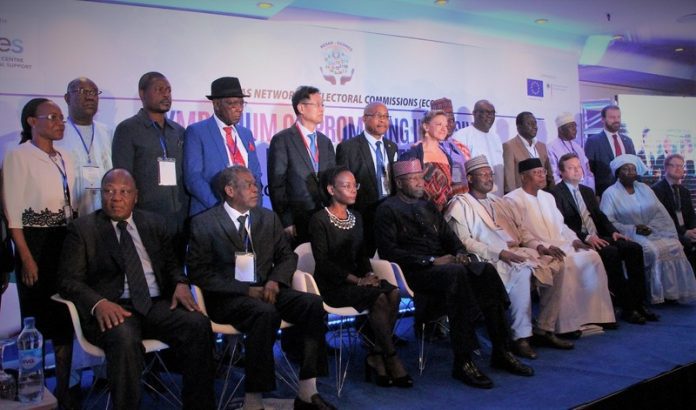Nigerian President Muhammadu Buhari has lauded the ECOWAS Network of Electoral Commissions (ECONEC) for promoting the best electoral standards and practices in West Africa.
Addressing the opening ceremony of the ECONEC Symposium on Political Inclusivity at the 6th Biennial General Assembly in Abuja, on Monday, Buhari noted that ECONEC is a platform for mutual assistance in the promotion of credible elections through experience sharing, peer learning and capacity building to bring out the best electoral standards and practices in the ECOWAS region.
Represented by the Secretary to Federal Government of Nigeria, Mr. Boss Mostapha, Buhari described as “very encouraging sign the steady progress in ensuring that all segments of society have a voice in the management of public affairs, especially through the democratic process”.
He recalled the efforts by the Nigerian government to promote political inclusivity and the signing into law on 31st May, 2018 of the “Not-too-young-to run” bill, and that the government was determined to ensure that “not only youth, but other categories of citizens such as persons living with disabilities and those internally displaced for various reasons are integrated into the electoral process”.
The Nigerian president, however, urged governments in the ECOWAS region to do more on political inclusivity through legislation.
He urged the Election Management Bodies (EMBs) to take the lead in this regard, noting that through ECONEC’s advocacy under the leadership of Prof Mahmood Yakubu, Chair of the Independent National Electoral Commission (INEC), Nigeria has provided logistics and technical support to ECONEC members such as Liberia, Sierra Leone and Guinea Bissau.
In his speech, the President of the ECOWAS Commission, Mr. Jean-Claude Kassi Brou, charged the participants to provide a “scalable blueprint to ensure that elections in West Africa become more inclusive and reflect the aspirations of all strata of our populations.”
Represented by Remi Ajibewa, director of Political Affairs, Brou listed some of the achievements of ECONEC and stated that “with the support of ECONEC, we have witnessed a significant improvement in the way elections are organized and conducted in our region”.
In his opening remarks, Prof Mahmood Yakubu, ECONEC President and Chairman of Nigeria’s electoral body, INEC paid tribute to ECONEC’s founding fathers and outlined the achievements by the Network in the past two years, including Needs Assessment, Post-election Follow-up, Solidarity and Peer Support and Learning missions to eight of ECONEC’s 15 members.
He noted that the intervention activities, including the study on cost of elections, International workshops on the use of technology in elections and on professional reporting of elections, have been carefully documented by ECONEC’s Programme Officer (Communications and Advocacy).
Prof Yakubu acknowledged the support by the Nigerian government to ECONEC members and thanked his colleagues on the Steering Committee for their sacrifice towards the realization of the gains chalked by the Network in the past two years.
He expressed the hope that the incoming Steering committee would build on the gains.
In his goodwill message, Mohamed Ibn Chambas, Secretary General’s special representative and Head of the UN Office for West Africa and the Sahel, (UNOWAS), reminded electoral institutions about the need to conform to some basic universal principles and practices of governance and human rights, including the rights of women and persons of disability enshrined in the Charter of the United Nations.
Chambas, who was the President of the ECOWAS Commission when the Network was formed in 2008, congratulated ECONEC for “great strides,” recorded and reaffirmed UNOWAS’ support to the commissions.
Other goodwill messages were from the Head of the European Union’s Delegation to Nigeria and ECOWAS, Mr. Ketil Karlson, Monica Frassoni, President of the European Centre for Electoral Support, ECES, Head of Programme of the German Agency for International Cooperation, GIZ, Christian Voelkel and rtd. Chief Justice Hamid Mahamoud Hamid, Chair of the Electoral Commission, Zanzibar and Head of the Electoral Commissions Forum of Southern African Development Community (SADC).
The opening ceremony of the twin events organised by ECONEC in collaboration with INEC and ECES, with funding from the European Union also featured the presentation of two ECONEC publications – Report of the Cost of Elections Study and ECONEC Activities in Support of Credible Elections.
The symposium is expected to recommend concrete steps towards enhancing political inclusivity, while on the agenda of the ECONEC General Assembly, which opens on Tuesday is the election of a new Steering Committee to replace the out-going team headed by Prof. Yakubu.
GIK/APA


